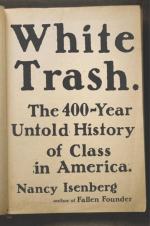|
This section contains 1,174 words (approx. 3 pages at 400 words per page) |

|
Summary
Isenberg begins this chapter by describing both the distinguished background and class identity of Benjamin Franklin. Born in the middle class and lifted upward by his contributions to writing, Franklin was in the best position to argue class politics. Franklin would attempt to approach class dynamics as a science. Isenberg captures Franklin’s ideology that human behavior is rooted in pleasure and pain; in other words, the desire to seek pleasure and the parallel instinct to avoid pain. He boasted of a “happy mediocrity” model of America in which extreme economic inequalities would be alleviated and farmers would be both self-sufficient and consumers of English goods. If small farmers were to produce goods, they would also have to produce – or breed – children. Children, Franklin argued, are the foundation for a successful society; they must be hard...
|
This section contains 1,174 words (approx. 3 pages at 400 words per page) |

|




